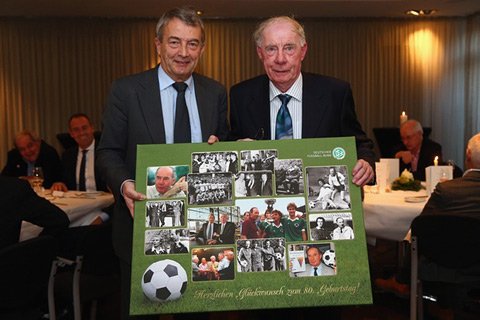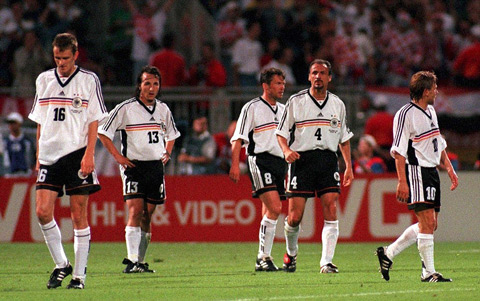|
Vietnam football flops against Thai teams in particular and in other regional tournaments in general are suggestive that investment in youth football training remains insufficient and improper. In this aspect, certainly no countries can surpass Germany, who celebrated their title of World Cup championship one year ago.

In the photo: The Germany team won the championship title in the 2014 World Cup.
No comparison can be made between Vietnam and Germany football, but at least we can learn basic things from them. Below is a story about Dietricht Weise, a former youth team coach associated with a milestone era of changes in how Germans develop their football.
The scarcity of talents used to pose a hurdle to German football, just as it does with countless other countries. The scarcity is put down to objective causes: “There is little social pressure in Germany forcing you to improve your life with sports,” as Michael Skibbe said in 2001.
Weise expressed his disagreement with that point of view: “It doesn’t make sense. I’m positive that there’are enough talents in Germany. We simply haven’t located them. Shamfully those we discovered now do not spend enough time practicing with the ball.”
Alongside his assistant, sports scientist Ulf Schott, Weise paid visits to regional football associations, as well as football confederations in neighboring countries. They even spoke to coaches in other sports.
After nine months, what they drew out was that many of the local talents have been drained and wasted in the old method. Schott said: “Local associations either do not have sufficient finance or human resources. This is unfair.
Every child in Germany deserves equal opportunities. We also learned major football teams have not made sound investment in developing youth football.”
Weise then came up with solutions, including setting up a widespread network of academies with state-of-the-art training centers in each locality. However, the Germany Football Association instantly rejected the idea due to huge costs involved.

In the photo: Wolfgang Niersbach, President of the German Football Association, poses with Weise in his 80th birthday.
The World Cup 1998 disaster, specifically the humiliating flop against Croatia in the quarterfinal removed Berti Vogts from the coach bench, and prompted a daring decision. Egidius Braun, DFB president, approved Weise’s plan and agreed to spend 3.2 million German marks (approximately more than 1 million British pounds) founding 121 local football centers.
Each center must ensure there are coaches providing instructions on football techniques for 4,000 children aged 13 to 17 once a week and two hours each session. In addition, around 10,000 boys under 12 would also receive training directly from regional football associations. The total annual cost was estimated at 5.2 million marks.
“We’ve cherished our plan for some time. It’s time we put it into practice and make the most of it,”
Franz Beckenbauer, DFB vice president, asserted.
Weise and Schott traveled across Germany for one long year to scout for appropriate sites for the new centers in the network. They visited hundreds of clubs, even those in the unimaginable remote areas.
Weise tried to talk parents into allowing their boys to follow their pursuits at football centers, and spent money hiring former footballers as coaches. He even supplied equipment and money for petrol to encourage students to enroll in the centers. “Everyone can go to centers in a 25-km range in the vicinity of their own home. That’s our ideas.” Weise said.
In the 2001/02 season, DFB ordered 18 teams in Bundesliga build youth training centers. Finance used to be a big problem. “How much will the plan going to cost?” “Is it necessary?” These are some of people’s concerns,” Schott recalled. Following the disappointing EURO 2000 season, it dawned on everyone that there must be a revolution/reform, particularly as Germany would host the World Cup in only six years.

Germany failed continuously at two major championships, the World Cup 1998 and EURO 2000.
The changes were formalized in October 2000, when DFL, an organization representing 36 clubs in Bundesliga and 2. Bundesliga, was founded. 2. Bundesliga teams Initially objected to the plan to set up the network of academies due to huge costs incurred, but everything finally went as planned.
Maintaining the academies gradually became a prequisite for a club to compete professionally starting the 2002/03 season. Within the two first years, 36 teams spent a total of up to 114 million euro (77.5 million British pounds) investing in the academies only.
The German Football Association followed suit in changing. Training centers aiming at kids aged 11 and 12 opened at 366 spots. At least 600,000 budding talents were discovered every year by 1,300 coaches from the association.
The annual cost for this activity amounts up to 14 million euro. Weise said “a few more million is not an issue any more. We have to finish what we left.”
In 2004, the Bundesliga U19 tournament in three geographical sections was held. The U17 batch also have their own tournament starting 2007.
“People don’t talk much about these things, but I believe the Bundesliga tournaments for youth squads are a vital part,” Ralf Rangnick, a former coach of Stuttgart youth teams and one of the most revered football insiders in Germany, remarked.
“Such tournaments help us easily compare the budding talents and directly help them make progress. It will also indirectly push teams to make sounder investment on hiring youth squad coaches.”
Below is the conclusion from Weise, an 80-year-old man who remains devoted to amateur tournaments in his locality. “As I witnessed Joachim Loew’s squad being named the champion of the World Cup 2014, I exclaimed that I myself had made a small contribution to the triumph.
The football Germans are playing today is based on a foundation developed from the then ideas. At least 10 national team members have been found this way. Take Toni Kroos for instance. The boy comes from a small town in Mecklenburg-Vorpommern. He could have never been known,” he noted.

